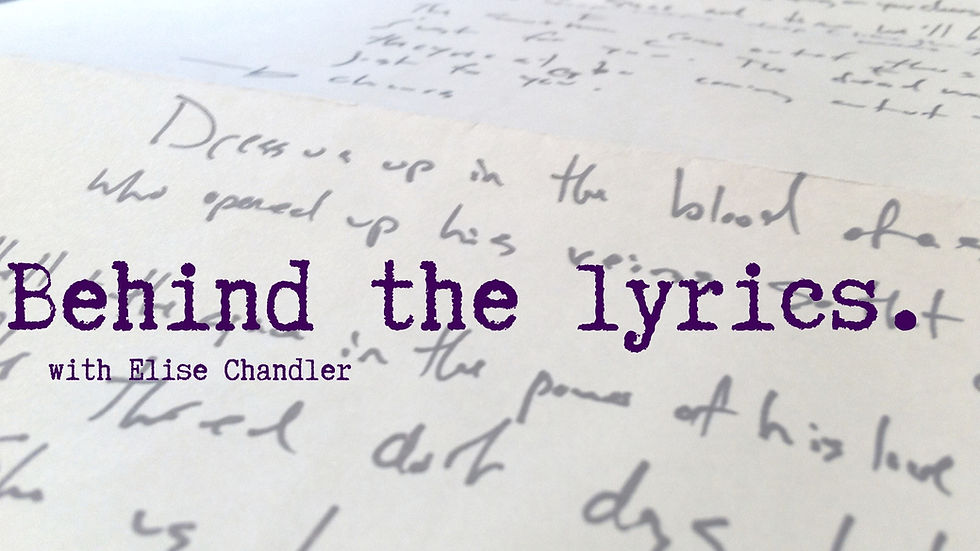Behind the Lyrics - 10/16/18
- Elise Chandler, Assistant Editor
- Oct 16, 2018
- 4 min read

Welcome to "Behind the Lyrics" with Elise Chandler. Each week, I find a song that I feel is understated both musically and lyrically, and I analyze it through several critical lenses.
For my first write-up, I wanted to focus on a band that is near and dear to me -- Muse. I discovered Muse thanks to an older, cool cousin of mine who studied music in college. It was due to her professional musical insight that I came to really appreciate everything Muse puts into their work, so without further ado, I present "City of Delusion".
"City of Delusion" came out on the album Black Holes and Revelations in 2006. This album contained popular hits like "Starlight" and "Knights of Cydonia", and it was a real shift in the band's sound. Matt Bellamy (lead vocalist) is quoted as saying it was the first album they didn't worry about how it would sound live (The Sun). The band traveled around, looking for inspiration musically and lyrically, and I think this song really represents that.
Musically, we start with an acoustic guitar, a very Latin feel to it, and Bellamy's vocals hauntingly flowing through. As the song continues, it builds to a crescendo, and the layering of instruments begins to file in. Violins, electric guitar, and trumpet all having their own piece, but all adding to the chaos that is the "City of Delusion".
In general, the album has a very political climate, but interestingly, this song was only played live a few times and only during the tour for this album (Muse Wiki). Bellamy has commented in an interview for Q Magazine that, "Black holes and revelations – they're the two areas of songwriting for me that make up the majority of this album. A revelation about yourself, something personal, something genuine of an everyday nature that maybe people can relate to. Then the black holes are these songs that are from the more ... unknown regions of the imagination."
With that in mind, let's delve into some of the more interesting parts lyrically of this song:
Before any of the layering begins, these are the lyrics given to us:
"Stay away from me Build a fortress and shield your beliefs Touch the divine As we fall in line"
Because they are the quietest part of this song, the listener's focus is solely on the rhythm of the guitar and these words. A pled to avoid the narrator. The narrator emphasizes that the listener should just build themselves a safe place (fortress) and avoid listening to anyone else's beliefs, especially someone who thinks like the narrator. Because if you do avoid people like the narrator, you'll be rewarded (touch the divine) for your closed-minded slave (as we fall in line) thinking.
Verse two begins the layering, and the crescendo to the chorus of the song, so it makes sense that it builds to a stronger confidence of the narrator. The lyrics here are:
"Can I believe when I don't trust? All your theories turn to dust I choose to hide From the All-Seeing Eye"
"Can I believe when I don't trust?" This can represent a lot, but because the album is politically charged, we can assume that this can mean some sort of media the government is pushing. "All your theories turn to dust." If the populace refuses to believe what the government is selling, the government holds no power over those people. As Bellamy's lyrics really gain ground, he declares, "I choose to hide from the All-Seeing Eye". Musically and lyrically, the narrator is taking his stand and holding his beliefs even against all the messages and propaganda being sent his way.
Finally, in the chorus, the musical layering is a sweet mixture. It all blends well together, and yet, it is very chaotic. It gives the song a rebellious feel. Lyrically:
"Destroy this city of delusion And break these walls down And I will avenge And justify my reasons with your blood"
We began the song with a call to action to "stay away", but now, the narrator has decided enough is enough. His call to action requires all moving pieces to "destroy this city of delusion", to destroy this fake world filled with untrue messages. He knows he cannot do it alone, but it is clear that something has personally wronged him because in the last two lines, he declares wailing he will take care of business even if it requires blood.
After researching the background of this song and looking at it lyrically and musically, I think it is one of Muse's best pieces. The members took pieces from many cultures and places and made it a song that was relevant and important. It sends a strong message and leaves as quietly as it enters, but with the slithering of thoughts to mull over long into the silence afterward. Isn't that what good music does? Challenge your thinking and the status quo?
Until next time.




Comments